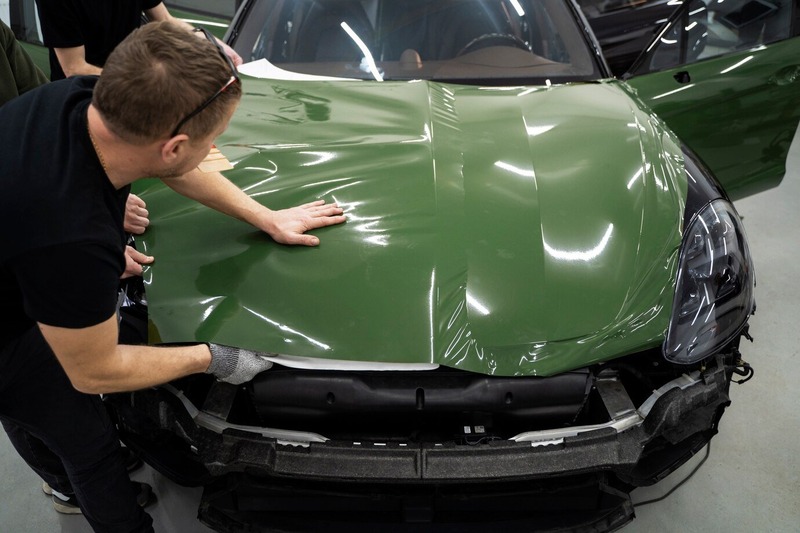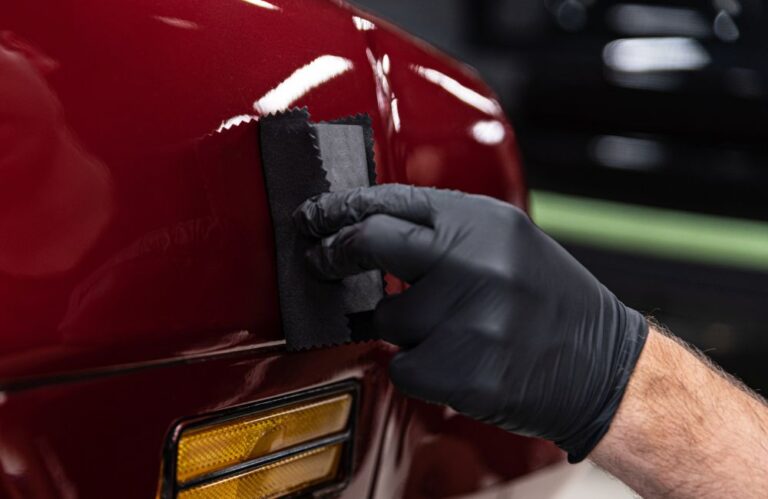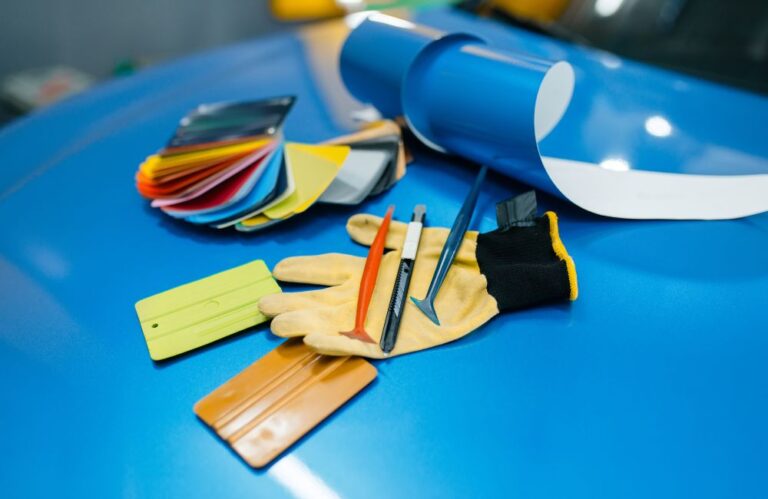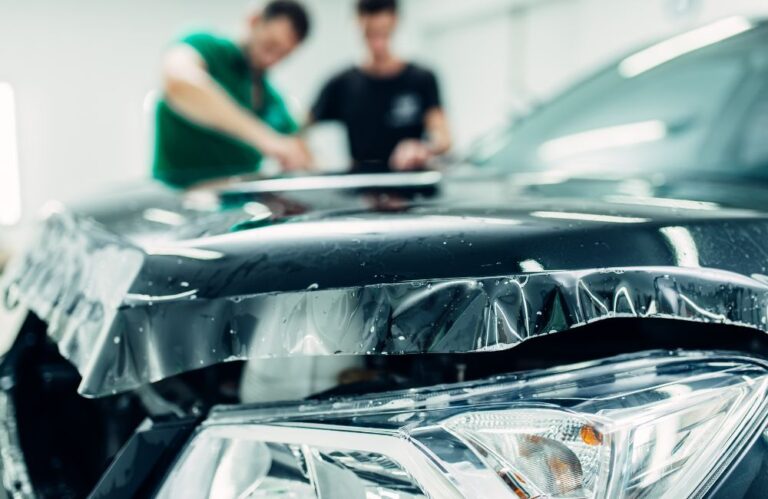Discover the perfect car wrap size, measuring tips, and vinyl ordering insights today. Elevate your vehicle’s style with a quality window company car wrap.
Vinyl car wraps have surged in popularity, offering car owners an exciting avenue for personalization and protection. Whether you’re seeking a sleek, matte black finish or an eye-catching custom design, vinyl wraps can transform your vehicle. But how much vinyl car wrap do you need to embark on this creative journey?
Table of Contents
- Key Takeaways
- Factors Affecting Vinyl Wrap Requirements
- Measuring Your Car’s Surface Area
- Ordering Extra Vinyl
- Frequently Asked Questions (FAQs)
| Key Takeaways ✔ Factors Affecting Vinyl Wrap Requirements The size and type of your car significantly influence the quantity of vinyl wrap needed.Complexity in design, such as full wraps and intricate patterns, may require more vinyl material.The choice of color and finish impacts the amount of vinyl required for a car wrap.Professional installers can optimize material usage based on the complexity of your project. ✔ Measuring Your Car’s Surface Area Square footage is the standard unit for determining the quantity of vinyl needed for your car wrap.Accurate measurements of various parts of your car’s exterior, such as the roof, hood, and trunk, are essential for precise calculations.Calculating the total surface area by summing up individual measurements ensures you order the right amount of vinyl.Complex car shapes or features may require professional assistance for accurate measurements. ✔ Ordering Extra Vinyl Ordering extra vinyl, known as overage, is crucial to account for potential mistakes and future repairs.Recommended overage percentages typically range from 5% to 10% of the total square footage needed.Balancing overage is crucial to avoid both material shortages and excessive costs.Consulting with experienced professionals can help you determine the ideal overage for your specific project. |

Factors Affecting Vinyl Wrap Requirements
According to Grand View Research, automotive wraps are gaining popularity since they can be applied in various vehicles such as taxis, vans, trucks, boats, RVs, trailers, and buses across the U.S.
When considering how much vinyl car wrap you need for your vehicle, it’s essential to understand the various factors that can significantly influence your requirements. The complexity of your project, the size and type of your car, and your choice of colors and finishes all play crucial roles in determining the quantity of vinyl wrap necessary.
Car Size and Type
The size and type of your car are fundamental considerations when estimating the amount of vinyl wrap you need. Car sizes can range from compact to mid-size, full-size, and even larger vehicles such as SUVs and trucks. Each category has distinct surface areas and shapes that directly affect the quantity of vinyl required.
- Small Cars: Compact vehicles like hatchbacks and sedans typically have less surface area to cover. Consequently, they demand less vinyl compared to larger vehicles.
- Large Vehicles: SUVs, trucks, and vans, with their extensive surfaces and unique shapes, require a more substantial amount of vinyl to ensure complete coverage.
- Unconventional Car Shapes: If your vehicle has unconventional features or angles, such as sportscars or custom modifications, these peculiarities may influence your vinyl wrap needs.
When considering the size and type of your car, remember that the goal is to achieve complete and seamless coverage. Smaller cars may be more straightforward to wrap, but larger vehicles and unconventional shapes can present exciting challenges for experienced installers. Reputable auto body shops like Car Wrap – Illmatic Wraps CT can help you determine the best coverage.
Wrap Design Complexity
The complexity of your wrap design is another critical factor to keep in mind when determining your vinyl wrap requirements. Car wraps in Danbury, CT, come in various styles, ranging from full wraps that cover the entire vehicle to partial wraps that focus on specific sections. Additionally, the intricacy of your chosen design, including patterns and graphics, can significantly affect the amount of vinyl needed.
- Full Wraps: Opting for a full car wrap involves covering the entire vehicle, from the roof to the bumpers. This comprehensive approach naturally consumes more vinyl as it leaves no area untouched.
- Partial Wraps: Partial wraps concentrate on specific parts of your car, leaving some areas exposed. These require less material compared to full wraps.
- Intricate Designs: If your design includes intricate patterns, intricate graphics, or detailed imagery, it will necessitate more vinyl to ensure the design appears precisely as intended.
Your design preferences and budget constraints often influence the choice between a full or partial wrap. Complex and detailed designs can be stunning but should be factored into your material estimation.
Color and Finish Choices
Your selection of colors and finishes for your car wrap plays a significant role in determining the amount of vinyl you’ll need. Different colors and finishes can have varying levels of opacity and coverage, directly affecting the material required for a consistent and attractive look.
- Glossy Finish: Glossy wraps are highly reflective and create a stunning, polished appearance. The high shine can highlight every contour of your car, which may require more vinyl to achieve a seamless look.
- Matte Finish: Matte wraps have a non-reflective, flat appearance, which can be more forgiving in terms of imperfections. They may require slightly less vinyl compared to glossy finishes.
- Satin Finish: Satin finishes strike a balance between glossy and matte, offering a subtle sheen. Their vinyl requirements fall somewhere between the extremes.
Additionally, your choice of color can influence material usage. Darker colors require more vinyl to achieve full opacity and vibrancy, while lighter colors are more forgiving. If you opt for custom colors or gradients, the complexity of the color scheme can also impact the amount of vinyl necessary.
Impact on Installation
Understanding how these factors influence your vinyl wrap requirements is essential for successful planning and budgeting. Incorrect estimations can lead to material shortages or over-purchasing, both of which can impact your project’s outcome and cost. Moreover, the installer you choose can also influence the quantity of vinyl required.
- Inexperienced Installers: An inexperienced installer may require more vinyl to compensate for potential mistakes, such as wrinkles or bubbles in the material. This can result in additional costs.
- Experienced Installers: Professionals who are well-versed in car wrapping techniques can optimize material usage, ensuring a precise fit without unnecessary waste. Their expertise can lead to cost savings.
Consider consulting with experienced installers to get accurate estimates and recommendations for your specific project. Expert installation is important since car wraps bring many benefits. For instance, an article from Medium states that vinyl wraps can transform any of your business vehicles into a mobile billboard, offering the benefits of a traditional billboard ad at a fraction of the cost.
Measuring Your Car’s Surface Area
Accurately measuring your car’s surface area is a crucial step in determining how much vinyl car wrap you need for your vehicle. Car wrap installation requires precise calculations to ensure complete and seamless coverage. Square footage is a fundamental measurement unit, and it plays a critical role in every car wrap project. To calculate square footage, you’ll need to measure the various parts of your car’s exterior and sum them up to get the overall surface area.
Measuring the Car’s Exterior
When measuring your car’s exterior for a car wrap in Danbury, CT, it’s essential to be systematic and thorough. Different sections of the vehicle have varying shapes and sizes, which need to be considered individually. Here are some key areas to measure:
Roof, Hood, and Trunk
- Roof: Begin by measuring the roof’s length and width. In most cases, the roof is a flat surface, making it relatively straightforward to calculate its square footage.
- Hood: Measuring the hood involves determining its length and width. Depending on the car’s make and model, hoods can vary in size and shape.
- Trunk: Similar to the roof and hood, the trunk should be measured in terms of length and width. Some cars have small trunks, while others have more extensive storage areas.
Sides and Doors
- Driver’s Side: Measure the length and width of the driver’s side, which includes both the front and rear doors.
- Passenger’s Side: Repeat the same measurements for the passenger’s side. It’s important to note that both sides may not be identical due to differences in door size or design.
- Overall Side: To determine the total square footage for both sides, sum up the square footage of the driver’s side and the passenger’s side.
Bumpers and Mirrors
- Front Bumper: Measure the length and width of the front bumper. Bumpers come in various shapes and sizes, so precise measurements are essential.
- Rear Bumper: Repeat the same process for the rear bumper, as it may differ from the front bumper in size and shape.
- Mirrors: Measure each mirror separately, accounting for any irregularities in shape.
By measuring each of these areas individually, you obtain precise square footage calculations for your car’s exterior. Remember that accuracy is paramount in ensuring you order the right amount of vinyl wrap.
Calculating the Total Surface Area
After measuring each part of your car’s exterior, you can calculate the total surface area by adding up the square footage for all the sections. This sum represents the overall square footage of the car, which provides the basis for estimating the amount of vinyl wrap required.
While this may sound like a meticulous process, it’s a necessary step to prevent any material shortages or over-purchasing. Car wrap installers like Car Wrap – Illmatic Wraps CT rely on these measurements to ensure that they have enough material to cover your vehicle accurately.
Considerations for Complex Shapes
In the case of vehicles with complex shapes or features, such as sportscars or those with extensive modifications, measuring can be more challenging. Complex curves and contours may require additional material to ensure that the wrap adheres properly without wrinkles or bubbles. It’s advisable to seek professional assistance in these cases, as experienced installers can account for these complexities when estimating material requirements.
Can Beginners Wrap a Car in 24 Hours?
Ordering Extra Vinyl
When planning your car wrap project, it’s vital to consider ordering extra vinyl. This additional vinyl, often referred to as “overage,” is essential for several reasons. Underestimating the amount of vinyl car wrap needed can lead to various issues, including material shortages, delays, and added costs.
Why Overage Matters
Ordering extra vinyl is a proactive measure that can save you from potential complications during your car wrap project in Danbury, CT. It serves as a safety net, providing additional material in case of unforeseen circumstances. Here’s why overage is significant:
- Wrapping Mistakes and Adjustments: Even with precise measurements and professional installation, errors can occur during the wrapping process. Wrinkles, bubbles, or misalignments may necessitate adjustments, which can consume extra material.
- Future Repairs: Over time, your car wrap may encounter wear and tear, particularly in high-impact areas like the front bumper. Having extra vinyl on hand allows for quick and cost-effective repairs, ensuring your car continues to look its best.
Recommended Overage Percentages
While the specific amount of overage required can vary depending on the complexity of your project and the experience of your installer, it’s generally recommended to order an additional 5-10% of the total square footage needed. This percentage provides a cushion that accommodates the unexpected without overcommitting to excessive quantities of vinyl.
The choice of overage percentage should be discussed with your installer, as their experience can help you make an informed decision. They can consider your car’s specific requirements, the complexity of your design, and the potential for errors during installation.
Avoiding Wastage and Excessive Costs
While ordering extra vinyl is essential, it’s equally important not to overestimate excessively. Ordering too much vinyl can lead to unnecessary costs and wastage, which can impact your budget. Striking the right balance between adequate overage and cost-effectiveness is key to a successful car wrap project.
Here are some tips to help you avoid high costs while maintaining an appropriate overage:
- Consult with Professionals: Experienced installers can provide valuable insights into the ideal overage percentage for your project, taking into account your specific circumstances.
- Evaluate the Complexity: Assess the complexity of your design and installation. If you have a simple design and a highly skilled installer, you may require less overage. On the other hand, complex projects may benefit from a higher percentage.
- Plan for Future Needs: Consider how long you intend to keep the car wrap and whether you anticipate making changes or repairs in the future. Planning for potential future needs can guide your overage decision.
- Reputable Suppliers: Work with reputable suppliers like Car Wrap – Illmatic Wraps CT, who can provide precise measurements and offer guidance on overage. This ensures that you receive the right quantity of vinyl without waste.
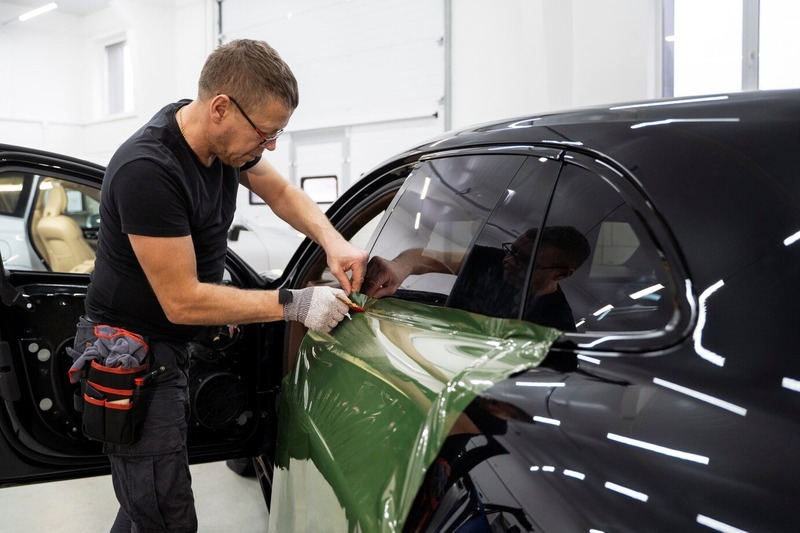
Frequently Asked Questions (FAQs)
How do I choose the right type of vinyl for my car wrap?
To select the ideal vinyl for your car wrap, consider your priorities. If you prioritize durability and longevity, opt for high-quality cast vinyl. For a budget-friendly option, calendered vinyl may suffice. Additionally, choose a reputable brand and consider the vinyl’s finish based on your aesthetic preferences.
Can I wrap my car myself, or should I hire a professional?
You can attempt a DIY car wrap, but professional installation is often recommended. DIY projects demand substantial time, patience, and skills, and the results may not match professional standards. Professional installers have experience, access to specialized tools, and a better understanding of the nuances of car wrap application, ensuring a superior outcome.
What’s the typical lifespan of a car wrap?
The lifespan of a car wrap depends on several factors, including the quality of the vinyl, the climate, and maintenance. High-quality vinyl wraps, when properly cared for, can last up to 5-7 years or more. In harsh climates with extensive sun exposure, the lifespan might be shorter.
How can I maintain my car wrap to prolong its lifespan?
To maintain your car wrap effectively, regularly wash your vehicle using a gentle car wash solution and a soft microfiber cloth or sponge. Avoid abrasive cleaning materials and wax that contain petroleum distillates. Parking in a garage or shaded area can help protect the wrap from excessive UV exposure. Regular maintenance and avoiding harsh conditions can extend the lifespan of your car wrap.
Is it possible to remove a car wrap without damaging the vehicle’s paint?
Yes, car wraps can be removed without damaging the underlying paint when done correctly. Professional installers use techniques and tools to ensure the safe removal of the wrap. However, leaving the wrap on for an extended period or attempting to remove it without expertise can increase the risk of paint damage.
Can I wash my car as usual with a car wrap, or are there specific care instructions?
While you can wash your car with a car wrap, it’s advisable to use a pH-neutral car wash solution and a soft cloth or sponge to avoid damaging the wrap. Avoid abrasive brushes or high-pressure washers, as they can cause the vinyl to peel or lift. Careful maintenance is essential to preserve the wrap’s appearance.
Are car wraps only for aesthetic purposes, or do they provide any protection to the vehicle’s paint?
Car wraps offer both aesthetic customization and protection to the vehicle’s paint. They act as a barrier against minor scratches, chips, and UV rays, safeguarding the original paint. This dual functionality makes car wraps a popular choice for car owners looking to enhance the look of their vehicles while preserving their paint finish.
Elevate Your Car’s Style with Car Wrap – Illmatic Wraps CT!
For those in the Danbury, CT area, we highly recommend considering the expertise and professionalism of Car Wrap – Illmatic Wraps CT. Our skilled team of installers not only ensures precise measurements and quality materials but also guarantees an exceptional final result that will leave your car looking stunning and protected. Contact us today to get a car wrap that combines aesthetics, protection, and expert craftsmanship.

